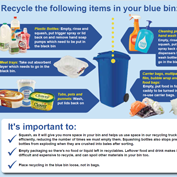Someone put a grenade in their blue bin!
Would you believe the things people put in their blue bins?
News
![Found in a blue wheelie bin [4] – a-metal tape measure. Only things which can be recycled easily should be put into your blue bin. SCDC has a list on its website.](https://www.hatley.info/wp-content/uploads/2019/09/Found-in-a-blue-wheelie-bin-09-Slim-grid-pic-570-x-125-px-deep.jpg)
A grenade, a toilet seat and disco lights are on a list of items people in south Cambs have wrongly put into their blue bins for recycling.
For National Recycle Week in September, South Cambs District Council released a list of inappropriate things found inside residents’ blue bins.
![Found in a blue wheelie bin [5] – a-toilet seat. Only things which can be recycled easily (so not hard plastics) should be put into your blue bin. SCDC has a list on its website.](https://www.hatley.info/wp-content/uploads/2019/09/Found-in-a-blue-wheelie-bin-10-Square-pic-177-x-177-px.jpg)
Someone put this old toilet seat in their blue bin, perhaps not realising hard plastics are difficult to recycle. Click the photo for a gallery of other things which should not be put in a blue bin.
It included a decorator’s paint tray and rollers (both covered in paint), metal tape measures, wellies, bricks and a games console controller.
None of these things can be recycled – other inappropriate things sent to the recycling plant at Waterbeach include car brake discs, a clothes horse, bowling ball, gas cylinders and lots of cuddly toys. All have come from residents’ blue bins.
On the positive side, items which can be recycled are sent off to re-processors to be turned into new products, with the council being paid for each tonne – helping to pay for council services and reducing the amount going to landfill.
Getting recycling right
Latest research from Recycle Now, organiser of Recycle Week, revealed that over 60% of UK households are recycling more than they were a year ago.
Nearly a third of those asked cited environmental concerns as the main reason for doing more – and others attribute it to an increased awareness of what can be recycled.
The research showed more and more UK households are recycling plastic drinks bottles, cleaning product, toiletry and shampoo bottles; other items include glass jars and bottles and tin cans.
And while it showed an increase in recycling, it also showed UK households sometimes incorrectly put items like nappies, wipes and clothing in their blue bins.
Putting the wrong things in your blue bin can mean it may not be emptied if they are spotted at the time of collection.
Worse still, it could mean an entire bin lorry load of recycling is rejected and ends up heading for landfill.
Here are some of the things which you can put in your blue bin for recycling:
- Clean tin foil. Save up small bits until you can scrunch into a tennis ball size. This keeps it all together as it passes through the recycling plant.
- Aerosol cans. Ensure they are empty – but don’t crush them. Metal like this is extremely valuable to re-processors and can be recycled endlessly.
- Empty plastic bottles from toiletries and cleaning products – including bleach, shampoo, nail varnish remover, etc.
- Cartons, e.g. Tetrapak juice and milk cartons.
And some things which definitely shouldn’t go in your blue bin:
- Food and liquid remains. A quick rinse or a wipe is usually enough to make your recycling clean. A tip for jars is to half fill with washing-up water, screw the lid on, shake and empty. Any leftover chemicals or oil should be taken to a household recycling centre.
- Batteries. If damaged or crushed, batteries can catch alight and cause fires in the back of bin lorries or at the recycling plant. Put them in a clear bag and attach the bag to your blue bin so they can be disposed of safely.
- Clothing and textiles. Take these to a clothing bank or charity shop. Even clean worn-out clothes have value and can be recycled this way for other purposes.
- Nappies, wipes, sanitary items, kitchen paper and tissues. These are all too dirty and low-quality to be recycled.
- Treated paper such as greaseproof paper, waxed cheese wrappings, butter papers.
- Black plastic of any sort, including black food trays.
- Black sacks, even if they contain recycling. Put recyclables loose in the blue bin.
You can find detailed guidance on what goes in which bin at www.scambs.gov.uk/bins.
There’s also useful information on this website, too, including details of our local recycling centres (which take a wider variety of materials than you can put in your blue or green bins) – www.hatley.info/practical-matters/rubbish-collection.
Your recycling is a valuable asset
A council spokesman said: “We should think of the things we put into our blue and green bins as an asset, not rubbish, because the council is paid for every tonne of suitable material and the money raised is reinvested into council services.
“It’s also worth stopping for a moment to think about what we buy – do we really need it? Does it have unnecessary packaging? Can the packaging be recycled? Then, can we re-use it and if we can’t, can it be passed onto someone else who will?
“We can also support recycling by buying products made from recycled materials. And buying something loose without packaging, taking a re-usable water bottle and only buying the food you know you will eat really does help.
“The challenges of plastic pollution and the way our climate is changing seem pretty overwhelming – while we can’t solve it all as individuals, if everyone does their bit each day, it all adds up.”
Gallery of things not to put in your blue wheelie bin.
Post created 23rd September 2019. Source: SCDC press release.

